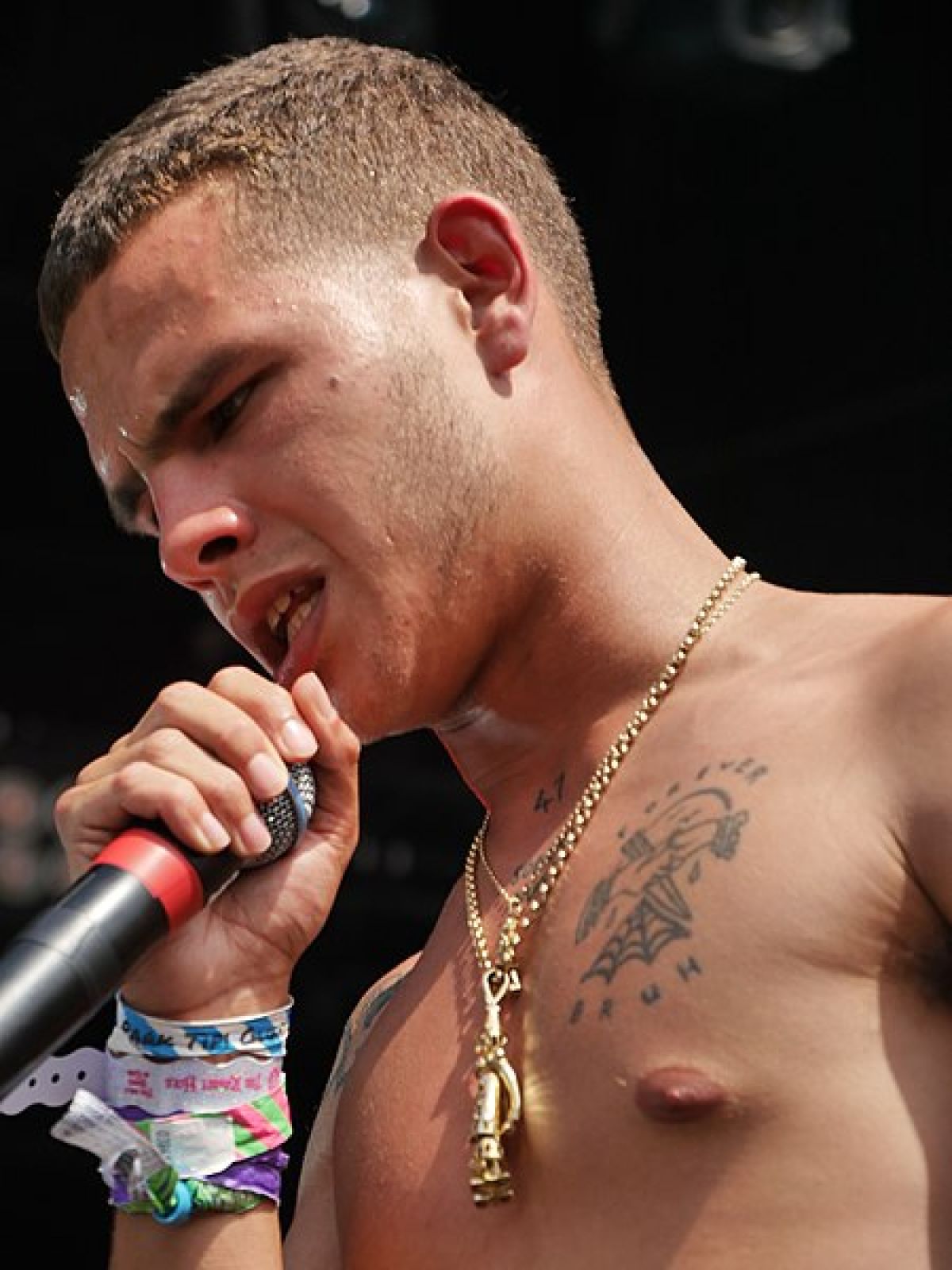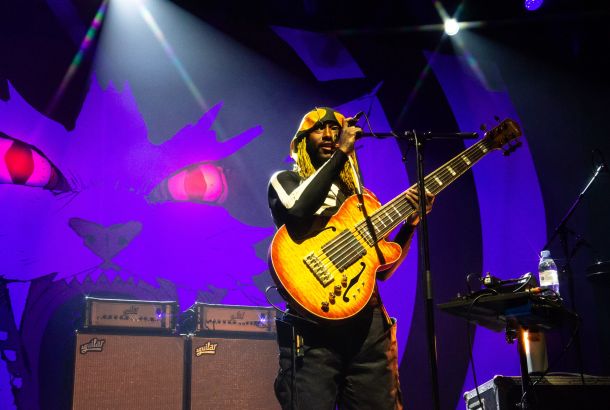Opinion: Slowthai’s Mercury Prize stunt cements him as a protest icon for the ages

As the erratic beat for Slowthai’s punk anthem ‘Doorman’ creeped in, the audience at the Mercury Prize and beyond waited with bated breath for this performance. The spectacle did not disappoint: Slowthai burst onto stage adorning a t-shirt covered in caricatures of a naked Boris Johnson, while holding an enlarged bloodied head of the PM to shouts of “Fuck Boris”.
As his initial immobilising entrance came to an end he grabbed the mic, giving the Mercurys a spine-tingling performance, embodying the artist’s gritty and cathartic shtick. As he held up the head once more to implant sarcastic kisses upon it, the focus of the camera shifted to presenter Lauren Laverne drolly stating “Slowthai, with his own views there”.
Enter Tyrone Kaymone Frampton, 24, hailing from the suburbs of Northampton. A man of mixed Bajan and Irish descent, Tyrone didn’t have the easiest start in life.
He was raised by his single mother along with his four siblings in an estate called Lings, colloquially known as “The Bush”. Tyrone’s brother Michael was gravely ill from birth with muscular dystrophy (MD), and sadly passed away at the tender age of one. This was compounded by the presence of his abusive stepfather: A violent and maniacal figure who took out the death of his son on Tyrone and his mother.
This is something very tenderly discussed in the haunting song ‘Northampton’s Child’, more spoken word than simple hip-hop, the lyrics saying “What’s Mum done to you/You’re lucky I’m not as big as you/I’ll punch you till my hands turn blue”.
School soon became an afterthought for Tyrone as he frequently missed lessons, toiled up with the loss of his brother and an absent father.
In an interview with The Guardian he talks about how he became the stereotype he felt was expected to be; the no-hoper; vexatious, bitter, and aggressive. He slowly cast off this image after moving away from Lings, and started studying Music at Northampton College. Influenced by other students, he became enthralled with the likes of Radiohead, The Streets and the work of Blur frontman Damon Albarn. After college and stints at work as a labourer and at Next, he packed it in to focus on music.
Adopting the alias ‘Slowthai’ he went about revolutionising British music with his raw aggression and social commentary: Fleshing out the troubles of broken Britain and lambasting the then-Prime Minister Theresa May.
Slowthai has a philosophy embodying his musical style and content. Popular music is saturated with dirge, material that doesn’t cut through to the way people experience life and think about the world and their place within it. Slowthai is a warrior for a new raging pastiche of punk, garage and grime: Something authentic and of its own. Something grounded in life experience: Domestic abuse, poverty, family bereavement, racial discrimination. In the violence and nihilism of the metaphor deployed by Slowthai at the Mercurys, we find something visceral, substantial and refreshing.
He has mentioned in previous interviews his value in the spectacle of performance. Speaking to The Guardian, Slowthai said he wants the listener to taste the album, to be part of something experiential and mimetic: “I want it to be so you can smell, you can taste, you can touch, you can see, you can hear. I want to build worlds”.
This is about no filters: He writes music for the disaffected and the impoverished. These aren’t issues that can be dealt with, understood, and portrayed lightly.
It’s about the pubs, local shops, football pitches, the working men’s clubs, and the estates. The peripheries left to rot while the centre enriches itself. When these issues are spoken about by ordinary people like Tyrone, it’s not always pretty. People are angry: The estates get gentrified, wages are stagnant, people in work rely on food banks, and hate crimes are on the rise. Slowthai truly embodies the idea that art should imitate life: The Mercurys is the latest and most pertinent example of his philosophy.
So, what does Slowthai and his latest performance say about contemporary Britain? In his performance we find a more powerful indictment of Boris Johnson than most commentators can muster. In his performance, we find something which says a lot about how right and wrong are portrayed, and how politicians are held to account.
The love in between much of the mainstream commentariat and politicians is real. Journalist and academic Ash Sarkar made the point in a recent Channel 5 debate around public trust in politicians. Journalists wax lyrical about the incisive manner with which they hold power to account, but I believe that it’s all hot air. Once the cameras are off, you can often find journalists and politicians alike at the same drinks receptions.
When journalist Ian Dale was faced with this critique by Sarkar, he laughed it off and made a joke at her expense, saying she simply ‘doesn’t get invited’ to these parties: Thus proving her point entirely.
Returning to Slowthai. When he holds up a bloodied head of Boris Johnson and says this is him holding up a mirror to the country, he really means it. Although the BBC can claim all they like that he performs “with his own views”, the fact is that’s not true.
Swathes of the population are tired of the decimated public sector, are tired of in-work poverty, and are tired of using food banks: A growing popular resentment to the establishment is manifested in Slowthai’s stunt.
When people see this, and they outright condemn the violence of his performance as unacceptable, and indoingso wholly prove his point – Slowthai is holding up a mirror to the country. People see his message and lash out: They say he’s inciting violence and that he’s a thug. He’s challenging people’s careers, lifestyles, and their politics. They don’t like that fact he’s making those challenges, and dress this fear up as an unsubstantiated ‘condemnation’ of his performance – as if art is no longer meant to represent the anxieties and struggles of society at large.
Slowthai’s stunt cements him as an icon of protest and the most radical and talented artist working today. He pulls no punches, cutting through establishment orthodoxy with a big bloodied metaphor. I see the fact he didn’t win the Mercury Prize as a travesty, but then again why would Slowthai care about what the judges think?
Slowthai, ultimately, captures the hearts and minds of a disaffected populace like no artist has done for a long time.







